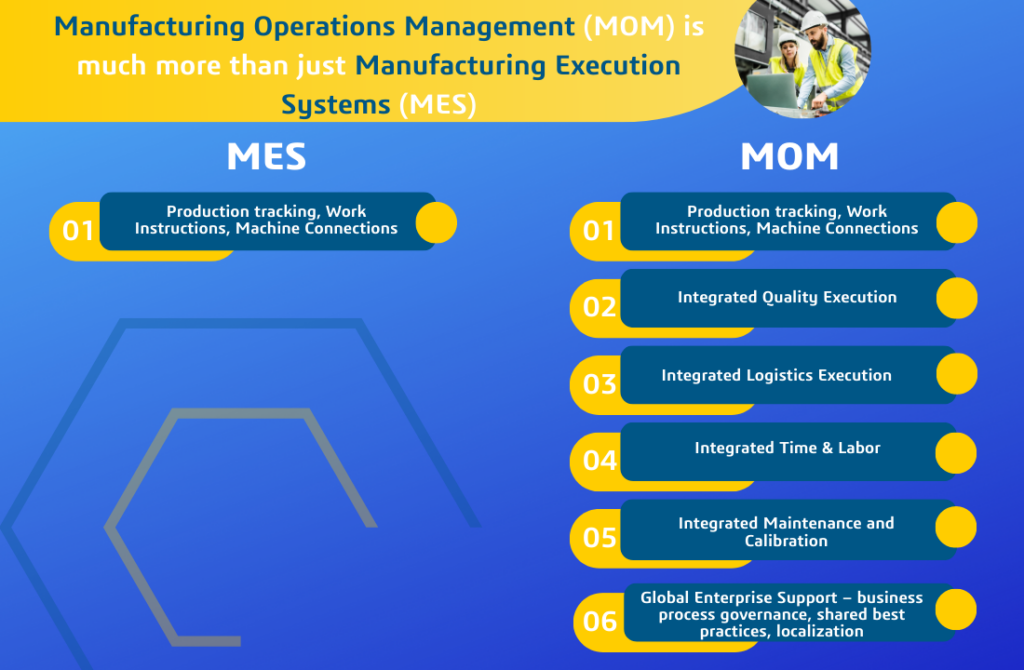Breaking it down task by task
Most of you have heard of the term MOM for Manufacturing Operations Management. More often, it’s used in combination with MES (Manufacturing Execution System). But what’s the difference between MES and MOM and why are these two terms used side by side?
Let’s get into this. I’ll start by examining the differences between the two.

What is a Manufacturing Execution System? (MES)
This shop-floor application directs the activities of labor, resources and materials to provide the right information at the right time. Manufacturing Execution System (MES) is a core component of the overall DELMIA Manufacturing Operations Management (MOM) scope.MES refers to guiding the operator in production tasks to be done, collecting genealogy data as products are produced, and collecting production data in real time. This data makes it possible for companies to optimize production activities from product creation to final production. MES can be considered a component of MOM. Think about gaining visibility and control over shop floor execution. Its primary purpose is to monitor, manage, and optimize the day-to-day processes inside the facility using data. This includes production tracking, work instructions, and machine connections, for example.
According to the ISA95 standard, MES roughly corresponds to the production dimension set of capabilities. It can therefore be mapped to the Production module of DELMIA MOM (Apriso). DELMIA MES software drives efficiency by using real-time data to trigger execution decisions and empower manufacturers to reduce waste, inventory, and cycle times while improving efficiency, quality, and customer satisfaction. A manufacturing transformation is achievable through MES providing full control over factory operations and improved production visibility.
An MES provides these capabilities:
- Helps to standardize production processes within a production facility for improved efficiency and product consistency
- Improves efficiency, manufacturing quality control software, and decision-making on the shop floor and in the warehouse
- Integrates with manufacturing ERP software
- Enables data-collection in real-time for continuous improvement
- Provides companies with real-time visibility and optimization for shop floor operations, production processes and resource management
What is Manufacturing Operations Management (MOM)?
MOM includes MES but also all activities that support production. Things like quality management, logistics, materials management, time and labor management— is the labor certified?–maintenance, calibration, and more. DELMIA Manufacturing Operations Management (MOM) software enables companies to handle all operations across their manufacturing enterprise via a single, unified solution that operates as a highly configurable manufacturing platform. As a result, users can manage and execute enterprise-wide manufacturing operations processes, including those associated with production, quality, internal logistics, warehouse, maintenance, labor, and the supply chain. MOM is related to the overall management of production operations across all manufacturing-related disciplines.
MOM is more comprehensive, and has access to more data in its architecture, so that means it delivers more intelligence to better support decision makers. It readily enables continuous improvement through better tracking and reporting as well as supporting operational agility by making process changes easier and faster to implement.
MOM is an extension of MES; it includes all basic MES (or Production) capabilities as well as extended capabilities in Logistics (Warehouse Management), Quality, Labor tracking, Maintenance, Machine Integration and Supply Chain. A Global MOM extends all of these capabilities across a global, multi-plant enterprise.
A Global MOM solution provides these capabilities:
- Delivers visibility into, control over and synchronization across all operations globally, enabling global best practices and process improvements that lead to lower cost, higher efficiency and improved customer service
- Unifies operational intelligence, enabling corporate management to accurately see and evaluate performance across divisions and plants, and thus identify areas that are performing well and areas that need improvement
- Converts a group of individual sites into a true manufacturing network where quality and efficiency can be maximized
The Takeaway
So, why are these two terms used together and how can we easily understand the differences? The reason may be obvious as they complement each other. Looked at this way, you could say that MES is really a subset of MOM. That makes sense, since MOM developed from MES. Stated differently, MES systems tend to comprise plant-based applications; MOM is more of an enterprise solution to manage the larger footprint of manufacturing, whether for one plant or across an enterprise.
Check out the DELMIA MES software and DELMIA MOM web pages for more details.
Watch the video to discover more:
Continue the converation in the DELMIA MOM Community.

